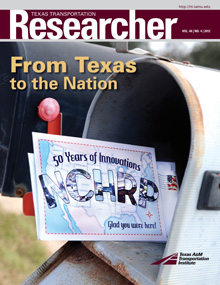The Texas A&M Transportation Institute (TTI) has been an integral part of the Strategic Highway Research Program 2 (SHRP 2) applied research team, addressing some of the nation’s most important needs for our transportation system concerning safety, renewal, reliability and capacity. In addition to the two projects profiled in more detail in this issue, TTI is currently conducting research in the following areas.
SHRP 2 C03: Interactions between Transportation Capacity, Economic Systems and Land Use Merged with Integrating Economic Considerations Project Development
Transportation planners can use a high-level case-based impact tool developed in this research to gain insight into the potential economic impacts of a transportation project. TTI provided background work supporting the framework aspects and metrics to be considered in the project.
SHRP 2 C11: Development of Improved Economic Analysis Tools Based on Recommendations from Project SHRP 2 C03
TTI helped develop tools to determine the value of access to markets. This information — including where changes in access can be expected and if that access can contribute to economic potential — can help inform decisions about transportation investments and strategies.
SHRP 2 L03: Analytic Procedures for Determining the Impacts of Reliability Mitigation Strategies
By defining reliability, this project explains the importance of travel-time distributions for measuring reliability and recommends specific performance measures for reliability. The project also examined the various causes of nonrecurring congestion and identified actions to reduce it.
SHRP 2 L05: Incorporating Reliability Performance Measures into Transportation Planning
This project developed the means — including technical procedures — for state departments of transportation and metropolitan planning organizations to fully integrate mobility and reliability performance measures and strategies into planning and programming processes. This will allow operational improvements of all types, including for capital projects and other expenditures, to be considered in planning and programming, along with more traditional types of project investments.
SHRP 2 L14: Effectiveness of Different Approaches to Disseminating Traveler Information on Travel Time Reliability
Researchers developed a guide to provide information about travel-time reliability most useful to travelers in ways appropriate to the specific technology platform and communication channel used. A secondary goal involved improving transportation system reliability.
SHRP 2 L08: Incorporation of Travel Time Reliability
This effort examined how information on the impacts of causes of nonrecurrent congestion (incidents, weather, work zones, special events, etc.) can be incorporated into the Highway Capacity Manual (HCM). The methodologies contained in the HCM for predicting delay, speed, queuing and other performance measures are not currently sensitive to traffic management techniques and other operation/design measures for reducing nonrecurrent congestion.
SHRP 2 R06: Plan for Developing High-Speed, Nondestructive Testing Procedures for Both Design Evaluation and Construction Inspection
This project generated plans to develop high-speed, nondestructive testing procedures for design evaluation and construction inspection of highway renewal projects. The research emphasized in situ testing, technologies and techniques that provide nearly complete coverage of infrastructure in real time or at least within 48 hours.
SHRP 2 R06(G): High Speed Nondestructive Testing
The research team identified nondestructive technologies for evaluating the condition (e.g., moisture, voids and corrosion) of various types of tunnel linings and their finishes, such as tile. Researchers evaluated identified technologies’ applicability, accuracy, precision, repeatability, ease of use, capacity to minimize disruption to vehicular traffic, and implementation and production costs. Researchers also recommended test procedures and protocols for successful implementation.
SHRP 2 R07: Performance Specifications for Rapid Renewal
Researchers developed a procedure for determining whether performance-based or methodology-based specifications should be used in specific circumstances for highway renewal.


